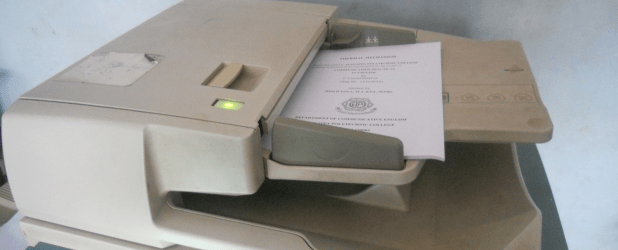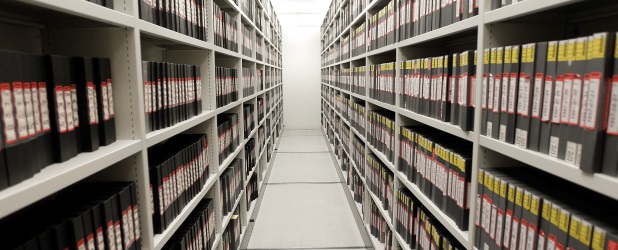Analyzing document scanning services vs document storage services? There are countless websites offering storage advice or selling their scanning solution as the “best” or “easiest. It can seem intimidating with all the options. How are you to tell which one is best for your business?

It is important to first take a step back and decide what you need. What are the pros and cons of scanning vs storing paper documents? Which best matches your need? Are there legal or compliance reasons to choose one or the other? What cost is associated with each solution? When is it better to scan and when is it better to store? What are the different ways to scan and store? Below is a quick summary followed by a more in-depth analysis which includes the pros and cons of each option, some different ways to scan documents, and some different options for storage of documents. If you would like to talk to one of our representatives about our storage and scanning services click here now!

Document Scanning

Scanning Services Pros
Accessibility
One obvious benefit of having scanned documents is accessibility. The information contained in these documents is right at your fingertips. This makes the file quick to find and also easy to share. This can save enormous amounts of time versus manually retrieving articles and worrying about couriering them, etc. Electronic documents can be viewed anywhere and on many devices, such as laptops, smartphones, and tablets.
Environmental Friendly
There are some environmental benefits to also consider. While less paper means more trees saved, the environmental benefits of scanning go beyond that. Digital documents save on space, as there is not much physical space required because they’re stored on either a hard drive or cloud. This reduces the cost of physically storing paper and gives you additional space in your workplace that can be used for something else.
Indexing For Quick Searching
Another benefit of scanning files is that they may be indexed. This goes beyond the paper storage way of filing alphabetically. Electronic files can be searched by keywords, dates, alphabetically, and much more, so if something is accidentally misfiled, there are other ways of finding it. You wouldn’t have to worry about tearing apart filing cabinets to locate it. This, in addition to the savings document scanning affords in storage, can save a business a lot in worker hours making your business run more efficiently, and effectively.
Scanning Services Cons
Hardware Errors
Digital documents are more at risk of being lost due to disaster if the files are not properly backed up. This can be solved by having backup systems in place, but that will add to the overall cost of your scanning service.
Hacking Risks
Any breach in the security protecting these files could compromise sensitive information. If you choose to go with a scanning service you’ll want to invest in high-quality security systems.
Compliance
There are certain legal and financial files which may only be legally binding in hard copy due to notarization and signatures involved.
Document Storage

Document Storage Services Pros
Ease Of Reading
Paper copies are easier to read for more dense documents and are easier to highlight and take notes on. Some people also struggle in using technology and may have trouble opening up digital files or zooming in on small print.
Easier To Secure
It is easier to restrict physical access to sensitive documents than run the risk of being hacked. There will always be a possibility that these documents could be stolen, but digital documents can be obtained by people who are not even near your facility.
Compliance
As mentioned above, certain legal documents require a paper copy to be legally binding. In this case, having a well-organized file storage system is key.
Cost
General document storage is significantly cheaper than having documents scanned, indexed and stored electronically. Even long-term storage (for over 10 years) is still significantly less expensive than document scanning services.
Document Storage Services Cons
Decay
Digital documents do not fall victim to the elements of time and the wear of usage. Paper documents can degrade easily if not properly stored and/or handled.
Ability/Time To Find Specific Information
Locating documents, especially if the file was not returned to the correct folder, or if you are unsure of the file location, can be very time-consuming. Digital document scanning and storing can easily solve this issue as you can search digital files by name, date, or even keyword.
Accessibility
When using document storage services, if you wish to view the document you have to retrieve it from the storage location. This can be a challenge if the storage location is off-site. Conversely, if you use document scanning services all employees can access any documents from any physical location, even home offices.
When Is It Better To Scan & When Is It Better To Store?

If you’re a business who deals with a large amount of paper filing and you can afford a high-quality network security system, we would suggest you go with scanning services. As an alternative, if you intend to store a very low level of documentation or you deal in documentation that is highly confidential (police/bank/medical documentation) then we would suggest using a method of document storage that does not involve scanning.
What Are The Different Ways To Scan Documents?
There are a couple of different ways that you can scan a document to hold on to your records digitally. At Blue Pencil, we offer 3 scanning programs: backfile document imaging, day forward imaging, and a custom scanning service.
Backfile Document Imaging: In this method we would take your previous documents that may have built up over time and we convert these documents into a digital formation. This is likely the method that we’ll use initially.
Day Forward Imaging: With this method, we would scan and convert newly created documents into digital format.
Custom Scanning Service: These would be methods such as on-demand scan requests and ad hoc batch scanning.
For each of these methods, the hard copy documents will be picked up and transported to our scanning facility in one of our secure trucks. Upon arrival, the documents are prepared for scanning and organized to prepare for them to be fed through our state-of-the-art high-speed scanners. We’re able to produce black and white or color scans depending on your needs. Once scanned, these documents can be accessed through an online digital storing system or we can prepare the files in a digital format and store it on secure media such as DVDs or portable storage units, depending on your needs. We can also then either return your hard copy documents to you or secure them in our long-term secure storage facility where they will be destroyed once the retention period ends or we are given authorization. You can learn more about our scanning services here.
What Are The Different Ways To Store Documents?
As with the scanning services we offer, our storage services have a number of different options as well. These include long-term storage, active file management, and vital record protection.
Long-Term Storage: With our long-term storage option your documents will be picked up and will be securely handled and scanned at our facility so that you always know exactly where they are. There they will be monitored 24/7 by our security systems, climate controlled for best preservation and protected from fire and natural disasters.
Active File Management: This is a good option if your company requires access to files on a consistent basis. Our team will perform a thorough assessment of your business and develop a customized active file storage solution for you. You can also choose between managing your files on-site or off-site.
Vital Record Protection: This is the best option for important documents such as wills, contracts, patents or any other critical information you may have. We will store these documents in specialized storage vaults that are incredibly secure and climate controlled.
Contributions were made to this article by the writer Rayanne Scholl

